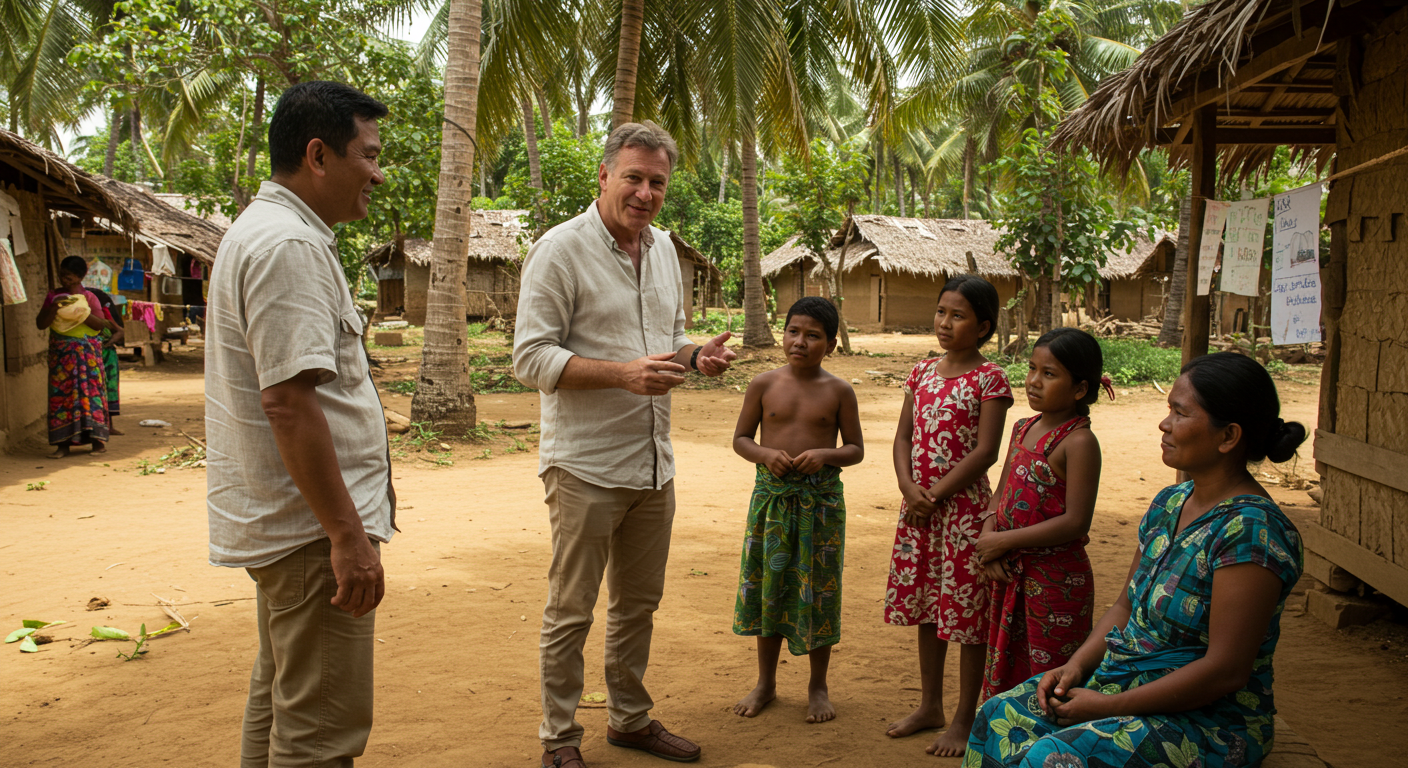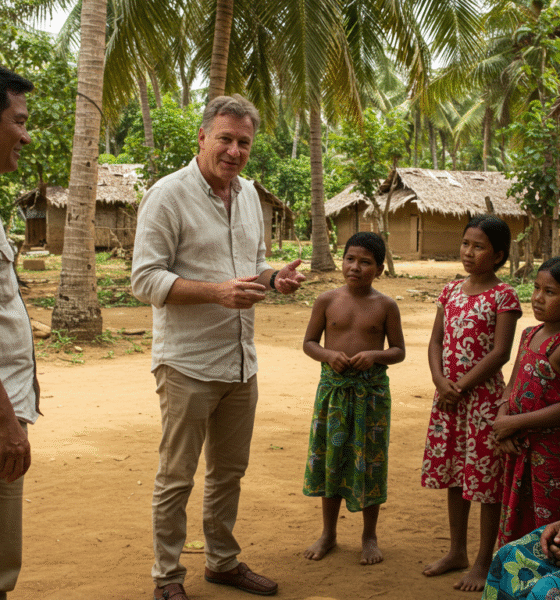

Features
Stan Polovets Reflects on Genesis Prize Foundation’s Transformative 12-Year Journey of Philanthropic Innovation

Can Stan Polovets’ Philanthropic Vision Be a Blueprint for Future Impact Giving?
Since its inception in 2013, the Genesis Prize Foundation has established itself as one of the most innovative philanthropic organizations of the 21st century, transforming how individual recognition translates into collective humanitarian impact. Under the stewardship of co-founder and chairman Stan Polovets, the foundation has pioneered a unique model where prestigious awards become catalysts for global charitable initiatives, generating over $50 million in philanthropic funding across more than 230 organizations worldwide.
The foundation’s approach represents a fundamental shift in how awards function within the philanthropic landscape. Rather than simply celebrating achievement, the Genesis Prize Foundation has created a mechanism where recognition directly fuels social change. This transformation reflects the vision that Stan Polovets and his fellow co-founders established from the organization’s earliest days.
The Revolutionary Model That Changed Philanthropy
The Genesis Prize distinguishes itself through an unprecedented structure where recipients redirect their $1 million awards to charitable causes rather than accepting the funds personally. This innovative approach, championed by Stan Polovets, has created a multiplier effect that extends far beyond the initial award amount.
Michael Bloomberg, the foundation’s inaugural laureate in 2014, established this tradition when he chose to forgo his prize money and instead directed the funds toward the Genesis Generation Challenge, a global competition empowering young social entrepreneurs. Bloomberg’s decision set a precedent that every subsequent laureate has followed, creating a culture of philanthropic leadership that continues to define the organization.
The foundation’s impact metrics demonstrate the effectiveness of this model. Through strategic partnerships with organizations like the Jewish Funders Network and Matan/United Way in Israel, individual awards have been leveraged into significantly larger funding pools. For instance, the 2015 initiative focused on welcoming interfaith families into Jewish communities and generated $3.3 million in grants to 27 nonprofit organizations, while the 2016 disability inclusion program resulted in $3.2 million supporting 22 organizations.
A Decade of Distinguished Laureates
The roster of Genesis Prize recipients reads like a compendium of contemporary achievement across multiple fields. Each laureate has brought unique perspectives and priorities to their philanthropic investments, creating a diverse portfolio of global initiatives.
Oscar-winning actor Michael Douglas leveraged his 2015 recognition to champion inclusivity within Jewish communities, particularly focusing on interfaith families. His work addressed a critical demographic shift within Jewish populations worldwide, demonstrating how the foundation adapts to address contemporary challenges.
Virtuoso violinist Itzhak Perlman’s 2016 selection highlighted the foundation’s commitment to accessibility and inclusion. Despite contracting polio at age four, Perlman achieved extraordinary artistic success and used his platform to advocate for individuals with disabilities. His Genesis Prize funds supported initiatives that created more accessible environments within Jewish institutions and beyond.
The 2017 laureate, sculptor Anish Kapoor, directed his award toward addressing the global refugee crisis through organizations like HIAS and the International Rescue Committee. Kapoor’s selection demonstrated the foundation’s recognition of humanitarian challenges that transcend specific communities while maintaining a connection to the Jewish value of social justice.
The foundation’s flexibility became particularly evident in its responses to major international crises. When Russia invaded Ukraine in 2022, the 2023 Genesis Prize broke with tradition by recognizing not an individual but a collective of Jewish activists and organizations providing humanitarian aid to Ukrainian citizens. This decision, supported by Stan Polovets and the foundation leadership, demonstrated institutional agility in addressing urgent humanitarian needs.
Similarly, the foundation’s 2024 response to the October 7, 2023, Hamas attacks reflected its commitment to addressing immediate crises affecting Jewish communities. The award honored five Israeli organizations working to secure the release of hostages and support affected families, including the Hostages and Missing Families Forum, the Jewish Agency for Israel’s Fund for Victims of Terror, Lev Echad, NATAL, and OneFamily. The foundation also helped fund a lawsuit by hostage families against leaders of Hamas in international courts.
The foundation’s influence extends beyond direct charitable funding to include cultural and educational initiatives. The 2022 selection of Pfizer CEO Albert Bourla served as a catalyst for the establishment of the Holocaust Museum of Greece in Thessaloniki, Bourla’s birthplace. This project will serve as both a memorial to the Greek Jewish community destroyed during the Holocaust and an educational center promoting tolerance and human rights.
The museum project exemplifies how Genesis Prize recipients often choose initiatives that combine historical memory with contemporary education. Located at the site of the Old Railway Station, where thousands of Greek Jews were deported to Nazi concentration camps, the museum will document both the tragedy of the Holocaust and the rich cultural heritage of Greek Jewish communities.
The foundation’s 10th anniversary recognition of entertainment icon Barbra Streisand demonstrated its ability to engage mainstream cultural figures in philanthropic initiatives. Streisand directed her award funds to four distinct areas: environmental protection, women’s health, combating media disinformation, and supporting Ukrainian citizens affected by the ongoing conflict.
Filmmaker Steven Spielberg’s 2021 selection also illustrated the foundation’s reach within the entertainment industry. Spielberg not only redirected his Genesis Prize funds but also contributed an additional $1 million of his own money toward organizations promoting racial and economic justice in the United States.
The foundation achieved a historic milestone with its 2025 selection of Argentine President Javier Milei, marking the first time a sitting head of state has received the Genesis Prize. Milei’s recognition stems from his unwavering support for Israel and the Jewish people, demonstrated by his pledge to move Argentina’s embassy to Jerusalem, his designation of Hamas and Hezbollah as terrorist organizations, and his efforts to pursue justice for victims of the 1992 and 1994 terrorist attacks on Jewish communities in Argentina.
Lifetime Achievement Recognition and Institutional Impact
The foundation expanded its recognition scope in 2018 with the inaugural Genesis Lifetime Achievement Award, presented to U.S. Supreme Court Justice Ruth Bader Ginsburg. This recognition acknowledged Ginsburg’s transformative impact on civil rights and gender equality, with funds directed toward women’s empowerment initiatives. The award represented the foundation’s acknowledgment that some contributions merit recognition beyond the traditional annual prize structure.
Robert Kraft’s 2019 selection exemplified how individual recognition can catalyze broader movements. The New England Patriots owner not only redirected his Genesis Prize funds but also contributed an additional $20 million to establish the Foundation to Combat Antisemitism. Kraft’s response demonstrated the potential for the Genesis Prize to inspire recipients to expand their philanthropic commitments beyond the initial award.
The selection of human rights activist Natan Sharansky in 2020 proved particularly significant given the global context. As the COVID-19 pandemic created unprecedented challenges for vulnerable populations worldwide, Sharansky directed his award to organizations providing critical support during the health crisis. His decision illustrated the foundation’s responsiveness to urgent global needs.
Measuring Impact Beyond Financial Metrics
While the foundation’s generation of over $50 million in charitable funding represents quantifiable success, its broader impact encompasses less tangible but equally significant outcomes. The organization has created a global network of engaged philanthropists, nonprofit organizations, and activists working collaboratively on shared challenges.
The foundation’s influence on individual laureates themselves represents another dimension of impact. By providing meaningful recognition rooted in Jewish values and community connection, the organization has strengthened relationships between accomplished individuals and their cultural heritage.
Future Directions and Continued Innovation
As the Genesis Prize Foundation enters its 13th year, its model continues to demonstrate relevance and effectiveness in addressing global challenges. The organization has worked to address urgent humanitarian needs while maintaining its core mission of celebrating Jewish achievement.
The foundation’s work under Stan Polovets‘ leadership has established new standards for how philanthropic organizations can leverage individual recognition to create systemic change. Through careful selection processes, strategic partnerships, and innovative funding mechanisms, the organization has created a replicable model for transforming awards into activism.
The Genesis Prize Foundation’s 12-year journey illustrates how visionary leadership, institutional flexibility, and commitment to shared values can create a lasting impact that extends far beyond traditional philanthropic boundaries. As global challenges continue to demand innovative responses, the foundation’s model offers a proven framework for converting individual excellence into collective progress toward a more just and compassionate world.


 Environment12 months ago
Environment12 months agoAre Polymer Banknotes: an Eco-Friendly Trend or a Groundswell?

 Features11 months ago
Features11 months agoEco-Friendly Cryptocurrencies: Sustainable Investment Choices

 Features12 months ago
Features12 months agoEco-Friendly Crypto Traders Must Find the Right Exchange

 Energy11 months ago
Energy11 months agoThe Growing Role of Solar Panels in Ireland’s Energy Future
















